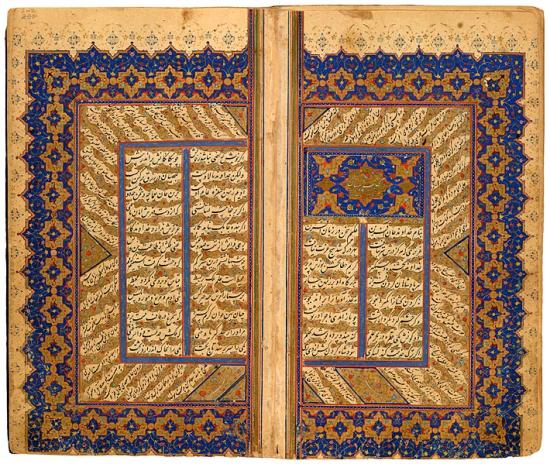
Double-Page Opening for Sa˓dī Shīrāzī's Būstān
Kulliyyat (Collected Works), in Persian, written by Hidayāt al-Kātib al-Shīrāzī
Purchased by Pierpont Morgan before 1913
Sa˓dī Shīrāzī, Anwari, and Firdausī were regarded as the three Persian Prophets of Poetry. There are no integral miniatures in this copy of Sa˓dī's Kulliyyat, but some of its major textual divisions are marked with ornate double-page headings (sarlauḥs). Such is the case with his two most famous works, the Būstān (The Orchard) and the Gulistān (The Rose Garden). In the latter, Sa˓dī wrote that "The children of Adam are limbs to each other, having been created of one essence." This was quoted by President Obama in an address to the Iranian people in 2009, when he argued that differences should not define us.
Persian poetry
The Persians loved their poetry and their poets, though the Qur˒an warned against believing their words (sura 69.41) and "those straying in evil who follow them" (sura 26.224). While Arabic was the first language of Islam and the language of the Qur˒an, Persian was favored by poets. Even Firdausī's (940–1020) celebrated Shāhnāma (Book of Kings), the national epic of Persian, was written in verse—some 50,000 couplets! Rūmī (1207–1273), the best known of the Sufi poets, put poetry in perspective when he wrote, "A hundred thousand books of poetry existed / Before the word of the illiterate [Prophet] they were put to shame!" (Masnavī I, 529). Presented here are illustrations of Firdausī's Shāhnāma as well as works by Sa˓ dī (ca.1184–1292), Hāfiz (ca. 1320–1389), and Jāmī (1414–1492), regarded as the last of the great Sufi poets. Also featured are illustrations from each of the five poems of the Khamsa (Quintet), by Niẓāmī (ca. 1141–1209), especially Lailā and Majnūn (The Persian Romeo and Juliet) and Bahrām Gūr's Seven Princesses.
